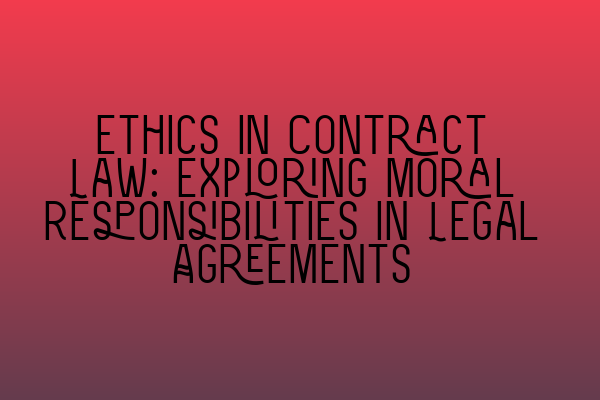Ethics in Contract Law: Exploring Moral Responsibilities in Legal Agreements
Welcome to SQE Contract Law, where we delve into the complex and fascinating world of contract law. In this blog post, we will be exploring the importance of ethics in contract law and the moral responsibilities that legal professionals must consider when drafting and enforcing legal agreements. We will examine the role of ethics in ensuring fair and just contractual relationships, and how it impacts the reputation and credibility of legal practitioners.
The Foundation of Contract Law
Before we dive into the ethical considerations, let’s first establish a basic understanding of contract law. Contracts are legally binding agreements entered into by two or more parties. These agreements stipulate the rights, obligations, and remedies for each party involved. Contract law is the legal framework that governs the formation and enforcement of these agreements.
Contracts are the backbone of our society, as they facilitate commerce, protect individuals and businesses, and provide stability in transactions. When entering into a contract, parties rely on the legal system to ensure that their rights are protected and that the terms agreed upon are upheld.
The Importance of Ethical Conduct
Contract law establishes a set of rules and principles that ensure fairness and integrity in contractual relationships. However, ethics goes beyond mere compliance with the law – it encompasses the moral responsibilities that legal professionals have in their practice.
Legal practitioners must act ethically and responsibly when drafting, negotiating, and enforcing contracts. They are entrusted with the duty to uphold justice, fairness, and honesty when representing their clients’ interests. This means that they should always act in good faith, disclose any conflicts of interest, and ensure that the terms of the contract are just and equitable for all parties involved.
Key Ethical Considerations in Contract Law
1. Integrity: Legal professionals have a duty to act with integrity when drafting and negotiating contracts. They must avoid any misleading or deceptive practices and ensure that all information provided is accurate and complete.
2. Confidentiality: Lawyers have an ethical duty to maintain client confidentiality. They must protect their clients’ information and not disclose it without their consent. This duty extends to all communications and documents related to the contract.
3. Conflict of Interest: Legal professionals must identify and disclose any potential conflicts of interest. They should not represent clients if their personal or financial interests conflict with their clients’ interests.
4. Fairness and Equality: Contracts should be fair and equitable to all parties involved. Legal practitioners should ensure that the terms are not unduly one-sided or oppressive. They have a responsibility to protect the weaker party from exploitation.
Consequences of Ethical Misconduct
Failure to adhere to ethical standards can have severe consequences for legal professionals and their clients. Breaching ethical rules can damage the reputation and credibility of lawyers, undermining the trust clients place in them. Legal practitioners may face disciplinary action or even be disbarred from practicing law.
Furthermore, contracts that have been drafted or executed unethically may be challenged in court. Judges have the power to set aside contracts that are deemed unfair, unconscionable, or against public policy. This can lead to costly litigation, reputational damage, and financial losses for all parties involved.
Conclusion
Ethics in contract law play a pivotal role in ensuring fairness, integrity, and justice in legal agreements. Legal professionals have a moral responsibility to act ethically and uphold the principles of fairness, equality, and honesty in their practice. By doing so, they not only protect the interests of their clients but also contribute to the credibility and trustworthiness of the legal profession as a whole.
At SQE Contract Law, we understand the importance of ethics in legal practice. If you’re preparing for your SQE examinations, be sure to check out our resources on SQE 1 Practice Exam Questions and SQE 1 Practice Mocks FLK1 FLK2. We also offer comprehensive SQE 2 Preparation Courses and SQE 1 Preparation Courses to help you succeed in your exams. Stay updated with the latest SRA SQE exam dates on our website.
Please stay tuned for more insightful articles on contract law and legal ethics.
